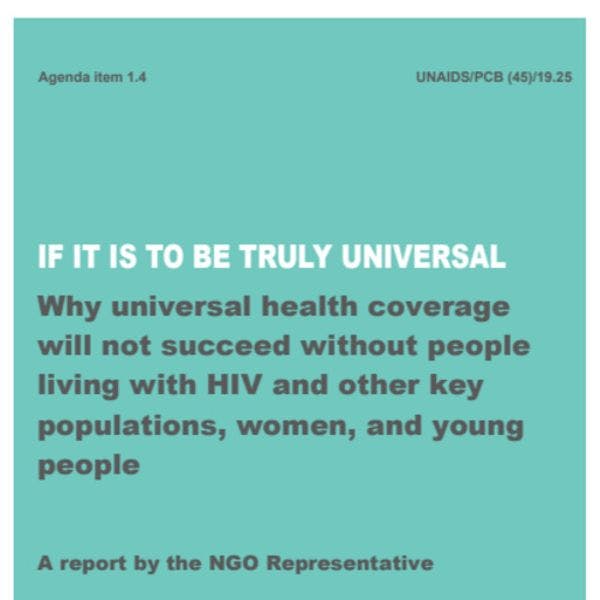Para que sea realmente universal: Por qué la cobertura sanitaria universal no tendrá éxito sin las personas que viven con el VIH y otras poblaciones clave, las mujeres y los jóvenes
La delegación de las ONG de la Junta de ONUSIDA formula una serie de recomendaciones sobre cómo las comunidades pueden contribuir a que se alcance una cobertura sanitaria verdaderamente universal.
Más información, en inglés, está disponible abajo.
Each year, the NGO Delegation to the Programme Coordinating Board (PCB) prepares a report on an aspect of the response to HIV that merits greater prominence, stronger policy perspective and clearer agreement across the United Nations Joint Programme on HIV/AIDS (UNAIDS).
For 2019, the NGO Delegation report focuses on the essential role of people living with HIV and other key populations, women and young people in making Universal Health Coverage (UHC) truly universal as an effective and efficient strategy that benefits all in need, including those most marginalized.
UHC is a critical issue for both the global health agenda and the global HIV response. It has been the subject of discussions and debates at national, regional and international levels. In some of those multisectoral forums, civil society–– including organizations and networks by and for people living with HIV and other key populations, women and young people––have expressed their needs and concerns in relation to UHC.
The forums have included the Thematic Session on UHC at the 44th UNAIDS PCB Meeting in June 2019, the first United Nations (UN) High-Level Meeting on Universal Health Coverage in September 2019, and the associated multistakeholder hearing in April 2019. The High-Level Meeting culminated in the approval of the Political Declaration on Universal Health Coverage.
The Political Declaration on Universal Health Coverage sets out Member States’ conceptual understanding of and political commitments to UHC. The text has been criticized by some in civil society for not explicitly naming key populations who are crucial to the HIV response, such as gay men and other men who have sex with men, people who use drugs, sex workers and trans people. That omission–– especially when compared to the Declaration's naming of "all children, youth, persons with disabilities, people living with HIV, older persons, indigenous peoples, refugees and internally displaced persons and migrants"––risks rendering certain populations invisible in UHC.
Another criticism of the Declaration is that it lacks a practical performance framework that will make results transparent and measurable.
In addition, the text fails to mention key conditions for ending the AIDS epidemic, such as the decriminalization of all key populations, a matter that is critically important to both key populations and the entire HIV response.
The Political Declaration does, however, provide a starting point for:
- educating communities about why UHC is important to the HIV movement; ▪ raising awareness about health as a human right; and
- initiating advocacy actions to strengthen government commitments to UHC and ensure that UHC at the country-level is truly universal.
Globally, the Declaration provides a consensus tool through which stakeholders can hold governments to account and advocate for action, including for ensuring that UHC is truly universal.
Purpose of report
The 2019 NGO Delegation Report builds on the foundations laid thus far for UHC, while looking ahead to its next phase, when the Political Declaration will be operationalized. During that phase, countries will contribute to the achievement of Sustainable Development Goal (SDG) target 3.32 and several other targets by accelerating the development and implementation of UHC plans, packages and partnerships.
To support this, the NGO Delegation report goes beyond civil society’s previous advocacy messages ("what we need from UHC") to a more forthright approach ("what we bring to UHC").
The report focuses in particular on the contributions of organizations and networks led by people living with HIV and other key populations, women and young people, which have played a unique and essential role in responses to HIV, and whose work can now be replicated, adapted and scaled-up in the context of UHC and other areas of health.
The 45th Meeting of the PCB is one of the first major international gatherings to take place since the UN High-Level Meeting on Universal Health Coverage. This report seeks to maximize this opportunity and the leadership role of the Joint Programme and Member States by:
- increasing understanding, and illustrating good practices and lessons learned about the significant contributions which communities, organizations and networks of people living with HIV and other key populations, women and young people can make to UHC, based on their experiences of responding to HIV; and
- reconfirming existing PCB decision points and recommending new ones, so the Joint Programme can support those contributions within the operationalization of the Political Declaration and the fulfilment of a truly universal UHC.
Temas
Regiones
Perfiles relacionados
- UNAIDS
